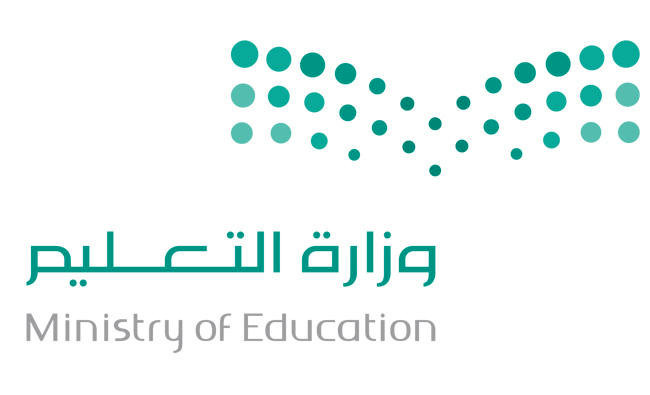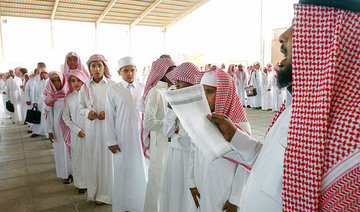RIYADH: The Saudi Education Ministry has launched a training program titled “Effective reform foundations for education policies: Research and policymaking,” presented by the Education Policy Research Center in cooperation with the World Bank.
The five-day program, taking place on Dec. 9-13, is aimed at people interested in research and studies on education policies.
The program’s topics include managing an effective education system, supporting teachers, promoting concepts and means to finance education, building foundations for early childhood education, and strengthening students’ evaluation and curriculums.
Dr. Ibrahim Al-Bidyawi, the ministry’s undersecretary for planning and development, inaugurated the program.
He said it aims to introduce trainees to the most important issues of education policies to qualify them as researchers in the field, thus contributing to building capacities in the field of improving educational policies and decision-making.
He also shed light on the partnership between the ministry and the World Bank, which aims to implement programs to develop the education system in line with the Saudi leadership’s aspirations and ambitions.
Saudi ministry launches training program on education policy
https://arab.news/n2vvj
Saudi ministry launches training program on education policy

- The five-day program is aimed at people interested in research and studies on education policies
Meteorology center forecasts 3 rainy days in most parts of Saudi Arabia

- People in coastal areas cautioned against high waves
RIYADH: Rain of varying intensities will prevail in most parts of Saudi Arabia from January 10 to 12, the National Center for Meteorology (NCM) forecast on Thursday.
In a weather bulletin, the center warned of downpours accompanied by winds of up to 60 kilometers per hour, and the possibility of torrential rain and hail. High waves are to be expected along the coasts, the NCM said.
The forecast said the northern regions of Al-Jouf, the Northern Borders, and Hail will have rainy conditions on Friday and Saturday.
Rain is expected in Tabuk and Madinah regions on Friday, the Eastern Province, Asir, and Jazan will see rainfall from Saturday to Sunday, and in Qassim on Saturday.
As for Riyadh and Al-Baha regions, rain are to be expected from Friday to Sunday.
The NCM urged the public to stay updated about the weather conditions in the Kingdom by visiting the daily reports on its website, the "Anwaa" application, or its social media accounts.
Saudi Falcons Club CEO and Kazakhstan ambassador discuss ways to boost cooperation

RIYADH: The CEO of the Saudi Falcons Club, Ahmed Al-Hababi, met Kazakhstan’s ambassador to the Kingdom, Madiyar Menilbekov, in Riyadh on Thursday to discuss opportunities for cooperation and ways in which these might be enhanced to benefit mutual goals.
One of the topics was the Hadad Program, a leading initiative developed by the club with the aim of returning falcons to their natural habitats and saving the species from the threat of extinction.
Menilbekov praised the club for the important role it plays in enhancing falconry and preserving its cultural heritage.
The club said the meeting was part of its efforts to strengthen international partnerships in keeping with the goals of the Saudi Vision 2030 plan for national development and diversification.
Saudi envoy to US outlines efforts to maintain safety of Saudi citizens amid LA wildfires

LOS ANGELES: Saudi ambassador to the US, Princess Reema bint Bandar, reaffirmed on Thursday the embassy’s commitment to the safety and security of Saudi citizens in Los Angeles and surrounding areas impacted by wildfires, the Saudi Press Agency reported.
In a statement, Princess Reema emphasized that the embassy and the consulate general were working tirelessly to support citizens affected by the fires.
She highlighted that ensuring their well-being remains a top priority for Saudi diplomatic missions in the United States.
She said the team was monitoring the situation closely and was prepared to provide immediate assistance to those in need. The embassy and consulate were dedicated to ensuring the security and safety of all Saudi citizens in affected areas, she added.
The embassy and consulate have activated a round-the-clock response team to address concerns and offer necessary support, SPA added.
The wildfires in California have prompted widespread evacuations and caused significant disruptions in the Los Angeles area, with officials working to contain the blazes.
KAUST conducts research study on microbiomes in glacier-fed streams

- Collaboration with scientists from Swiss Federal Technology Institute of Lausanne
RIYADH: The King Abdullah University of Science and Technology, in collaboration with scientists from the Swiss Federal Technology Institute of Lausanne, has conducted an unprecedented, in-depth study on microbiomes — microorganisms that live symbiotically with humans or other organisms — in glacier-fed streams.
These streams, originating from glaciers atop the Earth’s highest mountains, harbor a wealth of unique microorganisms.
The research team collected and analyzed samples from 170 glacier-fed streams over five years across regions including New Zealand, the Himalayas, the Russian Caucasus, the Tien Shan and Pamir Mountains, the European Alps, the Scandinavian Alps, Greenland, Alaska, the Rwenzori Mountains in Uganda, and the Ecuadorian and Chilean Andes, the Saudi Press Agency reported.
The findings, published in the renowned scientific journal Nature, represent the first global reference for microbiomes in glacier-fed streams.
These streams, which are among the most extreme natural freshwater ecosystems in the world, are located at mountain summits and are characterized by near-freezing temperatures and low nutrient levels.
They also serve as the origin for many of the world’s largest rivers, functioning as vital water reservoirs for the planet.
KAUST researcher Dr. Ramona Marasco emphasized that glacier-fed streams were highly vulnerable to climate change.
She spoke of the importance of establishing a baseline for their microbiomes to better understand the rate of ecological change, while highlighting KAUST’s extensive genetic sequencing efforts, which have significantly contributed to creating a comprehensive picture of these endangered microbiomes.
The researchers successfully developed the first global atlas of microorganisms in glacier-fed streams.
Their work revealed that these streams harbor a unique microbiome distinct from other cryospheric systems, such as glaciers, frozen soils, and ice-covered lakes.
About half of the bacterial species in these streams are endemic to specific mountain ranges. The scientists attribute this phenomenon to the geographical isolation of mountain ranges, similar to islands, and to the powerful natural selection exerted by the harsh conditions in glacier-fed streams.
Saudi swimmer’s remarkable 30km swim from Alkhobar to Bahrain

- Mariam Binladen’s feat of endurance and grit completed in over 11 hours
JEDDAH: In a remarkable feat of endurance and determination, Saudi Arabia’s Dr. Mariam Binladen recently completed the Khalid bin Hamad Swimming Challenge, covering a distance of 30km from Alkhobar, Saudi Arabia, to Salman City, Bahrain.
Binladen achieved this incredible feat in 11 hours, 25 minutes and 47 seconds.
Among her achievements, the open-water swimmer became the first Arab woman to cross the Red Sea to Egypt in October 2022, and the first to traverse Dubai Creek with a swim of 24 km in 2017.
In addition, she was the first woman from the Gulf to swim across the English Channel, covering 33.5 km in August 2016.
Speaking to Arab News about her feat on Dec. 26, Binladen said: “This swim was on my radar for 7 years.

“Unfortunately it was difficult to find an optimum window to do the challenge, primarily because weather conditions in the Gulf of Bahrain are incredibly difficult to predict.
“I had to study the sea very well taking into account the tides, wind speed, wave patterns, swells, water temperature and marine life cycles in order to minimize risk and achieve this goal.”
She added: “Amongst the many challenges of this event was swimming at night in the dark, in fluctuating cold-to-warm water temperatures, with the added complexity of tidal changes.
“As a way of mitigating the hazardous conditions the swim started at the Water Tower at Alkhobar at 1:50 a.m. Visibility was zero so I was swimming blind coupled with water temperatures ranging from 17 to 22 degrees.
“Instead of feeding every 30 minutes I fed every 15 minutes to avoid hypothermia and to maintain my body heat until sunrise, which was half-way through the swim.
“The tide in this area shifts every six hours which meant swimming part of the way against the tide which requires a huge amount of stamina and mental agility in order not to become exhausted.”
She added: “Each challenge poses its own distinct difficulties and unique set of conditions; during the Red Sea swim it was how to maneuver around sharks and avoid their feeding times.
“The English Channel, for example, was freezing cold and it is a busy shipping lane so it was necessary to address those concerns and plan accordingly.
“The Bahrain swim was undoubtedly hazardous and posed many issues, the distance being one of them. Before any swim I undertake area studies, conditions, risks and train to mitigate risks and for the conditions that I will face. Of course there are always some surprises.”

She has faced other challenges during her career. “My most unusual swim was in an ice glacier in Switzerland, this challenge was to swim in (minus) 2 degrees for 85 meters.
“I undertook extensive physical and cognitive training in order to prepare for this unique challenge. The burn of the ice-cold water will remain with me forever.”
In addition to being an athlete and dentist, Binladen also helps refugees and creates awareness through her platform, which has been acknowledged by organizations worldwide.
In 2016, she opened the first free medical facility of its kind for dental treatment in a Syrian refugee camp in Azraq, Jordan.
“Of course it is rewarding to treat any patients, I love to help people in any capacity I can, whether through treatment, inspiring them in sport or supporting them to swim gives me enormous satisfaction.”
As the Kingdom empowers women, Binladen said that she is delighted to be living at a time when Saudi women can pursue their ambitions in the workplace, sports and business.
“My advice to Saudi women is to never give up on your dream, with hard work and dedication you can fulfill your goals.”
On her future, she said: “It’s a common question, everybody is interested to know what’s next. All I can say is that I have a few possibilities in the pipeline and am carrying out area studies at the moment.”
“My ambition is to lead a fulfilling life in which I am constantly learning, developing, growing and making a positive impact on those around me, through my career, relationships or personal endeavors.
“I strive to pursue excellence and leave a lasting legacy that inspires others.”






















